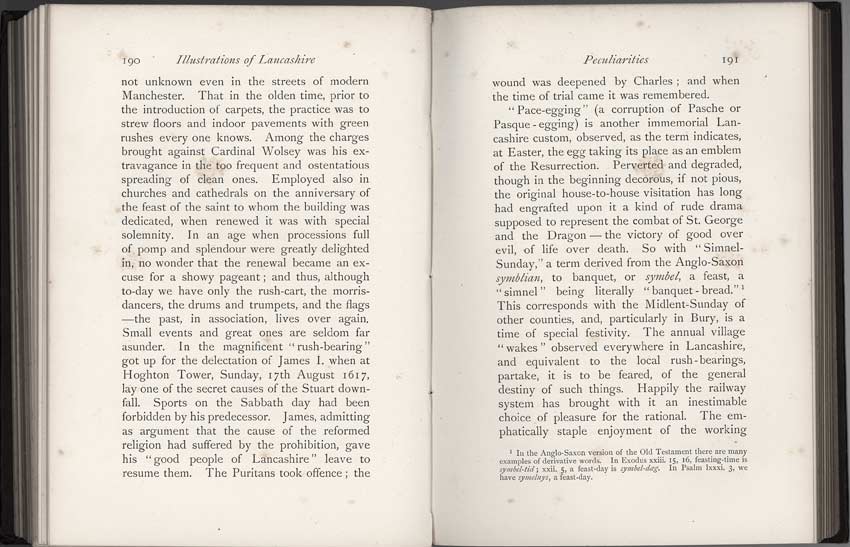
Scan and page transcript from:
LANCASHIRE - Brief Historical and Descriptive Notes
by Leo H. Grindon
Pub. 1892
pages 190-191 |
190 Illustrations of Lancashire not unknown even in the streets of modern Manchester. That in the olden time, prior to the introduction of carpets, the practice was to strew floors and indoor pavements with green rushes every one knows. Among the charges brought against Cardinal Wolsey was his extravagance in the too frequent and ostentatious spreading of clean ones. Employed also in churches and cathedrals on the anniversary of the feast of the saint to whom the building was dedicated, when renewed it was with special solemnity. In an age when processions full of pomp and splendour were greatly delighted in, no wonder that the renewal became an excuse for a showy pageant; and thus, although today we have only the rush-cart, the morris-dancers, the drums and trumpets, and the flags - the past, in association, lives over again. Small events and great ones are seldom far asunder. ln the magnificent "rush-bearing" got up for the delectation of James l. when at Hoghton Tower, Sunday, 17th August 1617, lay one of the secret causes of the Stuart down-fall. Sports on the Sabbath day had been forbidden by his predecessor. James, admitting as argument that the cause of the reformed religion had suffered by the prohibition, gave his "good people of Lancashire" leave to resume them. The Puritans took offence; the |
Peculiarities 191 wound was deepened by Charles; and when the time of trial came it was remembered. "Pace-egging" (a corruption of Pasche or Pasque-egging) is another immemorial Lancashire custom, observed, as the term indicates, at Easter, the egg taking its place as an emblem of the Resurrection. Perverted and degraded, though in the beginning decorous, if not pious, the original house-to-house visitation has long had engrafted upon it a kind of rude drama supposed to represent the combat of St. George and the Dragon - the victory of good over evil, of life over death. So with "Sirnnel-Sunday," a term derived from the Anglo-Saxon symblian, to banquet, or symbel a feast, a "simnel" being literally "banquet-bread."1 This corresponds with the Midlent-Sunday of other counties, and, particularly in Bury, is a time of special festivity. The annual village "wakes" observed everywhere in Lancashire, and equivalent to the local rush-bearings, partake, it is to be feared, of the general destiny of such things. Happily the railway system has brought with it an inestimable choice of pleasure for the rational. The emphatically staple enjoyment of the working 1. In the Anglo-Saxon version of the Old Testament there are many examples of derivative words. In Exodus xxiii. I5, I6, feasting-time is symbel-tid; xxii. 5, a feast-day is symbel-dæg. In Psalm lxxxi. 3, we have symelnys, a feast-day. |
